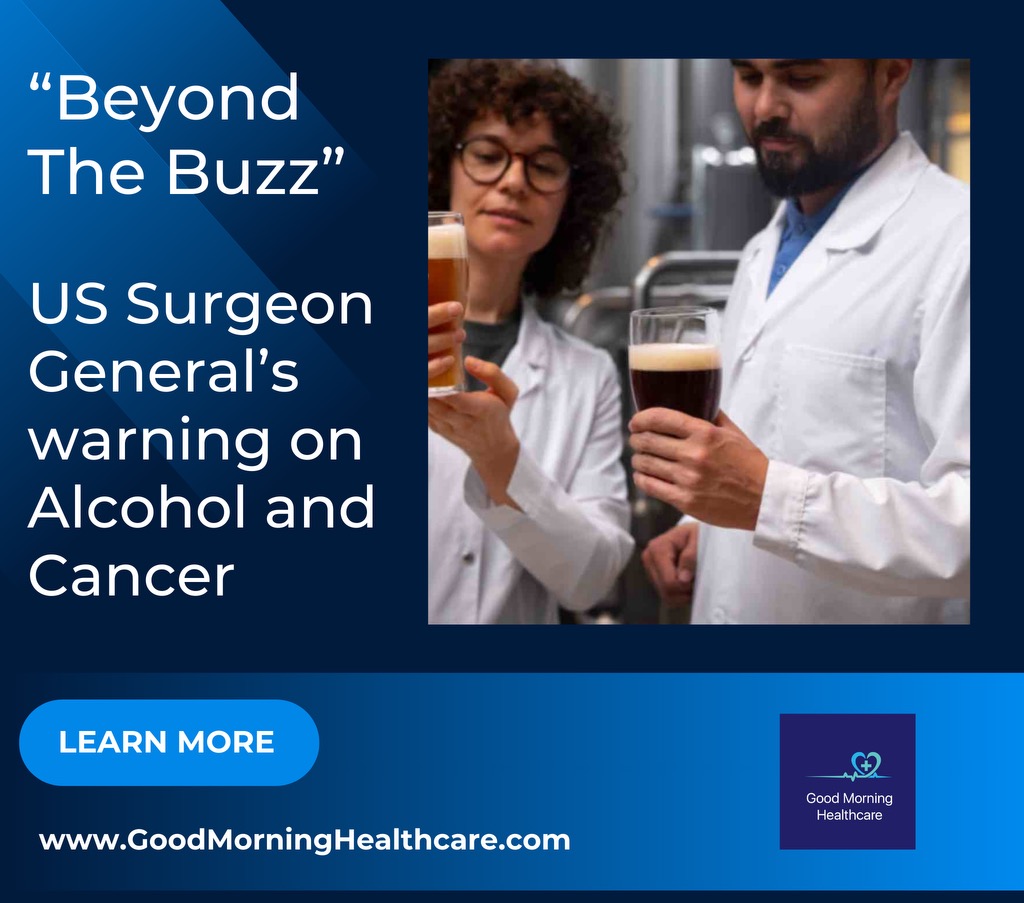U.S. Surgeon General Vivek Murthy has issued an advisory calling for updated warnings on alcoholic beverages, cautioning that consuming alcohol increases the risk of several types of cancer.
He emphasizes an urgent need for public awareness, updated beverage labeling, and proactive health measures.
Key Facts
- Drinking any alcoholic beverages, including red and white wine, beer, and liquor, is linked with some types of cancer. The risk increases with any amount of alcohol use.
- More than 20,000 people die from alcohol-related cancers each year in the United States.
- The risk increases for at least seven different types of cancer, including breast (in women), colorectum, esophagus, voice box, liver, mouth, and throat.
- Alcohol consumption is linked to approximately 100,000 cancer cases and 20,000 cancer-related deaths every year in the US.
What It Means for Consumers
Labels on alcoholic beverages should be updated to reflect these new risks. Current warnings focus on pregnancy and impaired driving. However, future labels could include clear messages about alcohol’s role in cancer development.
Dr. Vasilis Vasiliou, a leading researcher in alcohol and cancer at the Yale School of Public Health, supports this move. He stresses that “comprehensive prevention efforts must address alcohol consumption alongside broader environmental and lifestyle factors.”
The Science Behind the Data
Why does drinking alcohol raise cancer risk?
According to the Centers for Disease Control (CDC), studies show that alcohol can increase cancer risk in several ways:
- Alcohol can disrupt the way cells grow, increase chronic inflammation, and damage your DNA.
DNA is the cell’s “instruction manual” that controls how a cell grows and does its job. When DNA is damaged, a cell can grow out of control and become cancer.
2. Alcohol can increase levels of hormones, including estrogen. Estrogen plays a role in breast cancer development.
3. Alcohol makes it easier for the cells in our mouth to absorb cancer-causing chemicals (called carcinogens).
For example, when you use both alcohol and tobacco, the alcohol increases the absorption of carcinogens from tobacco.
Drinking and Aging
Drinking can also bring premature aging.
According to a recent report, one episode of binge drinking (consuming five or more drinks on the same occasion) was associated with a month and a half acceleration in biological aging.
The Surgeon General’s advisory reminds us that drinking as a social habit can also hurt our health in many ways.
Moderate Drinking and Health- New Insights
For years, a glass of red wine has been associated with improved cardiovascular health. However, today most experts say that drinking any amount of alcohol can increase the risk of heart disease.
Recent new studies seem to offer conflicting results, adding to the confusion.
Some of these studies have combined people who never drank with people who had stopped drinking because they were already ill with an existing disease.
This would make it seem that people who drank moderately were healthier than those who didn’t drink at all. As a result, the health benefits of not drinking might be hidden.
And there may be other reasons for the lower risk of heart disease in people who drink red wine in moderation, such as environment or lifestyle.
“Alcohol intake should not be recommended to improve cardiovascular health; rather, reducing alcohol intake will likely reduce cardiovascular risk in all individuals.” — Krishna G. Aragam, MD, MS, Cardiologist at Mass General Brigham
Common Sense Takeaways
- Do not start drinking for health benefits.
- Know your intake. Moderation is critical, less is better.
- Understand your risk factors. If there is a family history of cancer or alcohol use disorder, be even more careful.
Practical Tips for a Healthier Lifestyle
Swap alcoholic beverages for non-alcoholic options: Sparkling water, herbal teas, and mocktails
Incorporate antioxidant-rich foods: Grapes, berries, nuts, and leafy greens can offer the same health benefits as red wine without the risks.
Limit exposure to other carcinogens: Minimize contact with tobacco smoke, air pollutants, and processed foods to further reduce cancer risk.
Stay informed: Attend public health forums, read labels carefully, and follow updates from reputable sources like the Surgeon General’s office.
A Call to Action
The Surgeon General’s advisory is a wake-up call for policymakers, healthcare providers, and individuals.
To combat alcohol’s role in cancer:
- Healthcare providers should educate patients about the risks of even moderate drinking.
- Policymakers should push for updated labeling laws to ensure transparency.
- Individuals can take proactive steps by reducing alcohol intake and seeking healthier alternatives.
Conclusion
The Surgeon General’s advisory reminds us that alcohol is not just a social beverage—it’s a substance with profound health implications.
By understanding the risks and making informed choices, we all can take meaningful steps toward a healthier future.
At GoodMorningHealthcare.com, we are committed to raising awareness and supporting conversations that empower individuals to make better health decisions.
Our goal is to help build a world where prevention and education bring better health outcomes for all.

Excessive alcohol use includes:
Binge drinking—Four or more drinks for women, or five or more drinks for men during an occasion.
Heavy drinking—Eight or more drinks for women, or 15 or more drinks for men during a week.
Underage drinking—any alcohol use by people younger than 21.
Drinking while pregnant—any alcohol use during pregnancy.


Thank you, You will be automatically subscribed to the our newsletter.